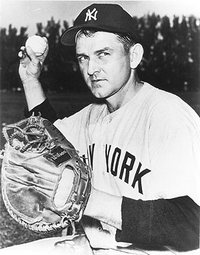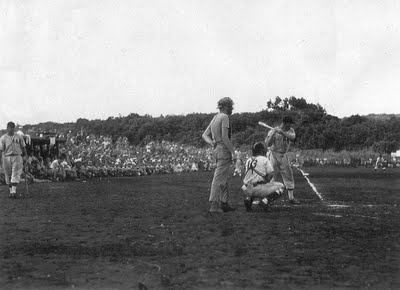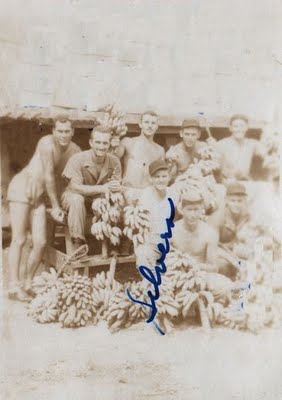

|
|
Charlie Silvera
Date and Place of Birth:
October 13, 1924 San Francisco, California
Died:
September 7, 2019 Millbrae, CA
Baseball Experience:
Major League
Position: Catcher
Rank: Unknown
Military Unit: USAAF
Area Served: Pacific Theater of Operations
The Yankees' back-up catcher during the heyday of DiMaggio, Berra and Mantle. Silvera served in the Pacific Theater with the USAAF and went on to play in the major leagues for 10 seasons.
 Charlie Silvera was born on October 13,
1924, in San Francisco, California. He grew up in the Mission
District, and attended St. Ignatius High School. “I had signed
to play pro ball in May 1942,” explains Silvera, “and along with
Jerry Coleman, reported to the Wellsville Yankees of the PONY
League for the remainder of the season.”
Charlie Silvera was born on October 13,
1924, in San Francisco, California. He grew up in the Mission
District, and attended St. Ignatius High School. “I had signed
to play pro ball in May 1942,” explains Silvera, “and along with
Jerry Coleman, reported to the Wellsville Yankees of the PONY
League for the remainder of the season.”
Silvera played 75 games with Wellsville and batted a respectable
.254 (Jerry Coleman hit .304 in 83 games). The following spring,
aged 18, he was called into the service and was initially
stationed at McClellan Field in California. The following year
Corporal Silvera was sent to Hickam Field in Hawaii, and then to
the Pacific islands where he played baseball with the 73rd
Bombardment Wing Bombers.
"I was stationed at Saipan and there were also two teams on
Tinian,” he explains. “We were attached to the 20th Air Force
and our team included Tex Hughson [Braves], Dario Lodigiani
[White Sox], Ferris Fain [Athletics] and Mike McCormick [Cubs].
"We used bomb crates as sideline markers and fences and because
Joe Gordon’s [Yankees] and Joe Marty's [Phillies] club [58th
Bombardment Wing Wingmen] had the most power, we would move the
bomb crates back 10 to 20 feet. With the other Tinian club
[313th Bombardment Wing Flyers] we would move the bomb crate
fence in depending on who was pitching.
58th Wingmen playing the 73rd Bombers on Saipan, August
1945. Joe Marty of the 58th Wingmen is at-bat. Charlie Silvera
is the catcher and Joe Gordon is on deck (far left).
Playing baseball
as entertainment for the troops may sound like a pleasurable way to
spend the war but it was not without its dangers. “Japanese soldiers
would watch the games from the jungle in the background and go back
and hide when the game was over. In our spare time we would venture
to places ‘off limits’. The Japanese were still around us but the
bananas were worth it!”
Bananas were
plentiful on Saipan for the 73rd Bombers.
(Back row, left to right): Tex Hughson, Dario Lodigiani, Ferris
Fain, Mike McCormick, unknown.
(Front row, left to right):
Charlie Silvera, unknown, Chet Kehn.
Furthermore,
Silvera believes that wartime baseball helped him to improve as a
player. “The war was unfortunate for a lot of major league players
because they lost two, three and sometimes four years in the
service,” he says. “I was fortunate to play with great players and
benefit from their guidance and experience.”
Silvera was back in the Yankees’ organization in 1946 and played 91
games with the Kansas City Blues of the Class AAA American
Association. In 1947 he joined the Portland Beavers of the Class AAA
Pacific Coast League, and after batting .301 with Beavers in 1948,
Silvera made his major league debut with the New York Yankees for
four games at the end of the season.
Silvera spent the next eight years as a back-up catcher to Yogi
Berra and was eligible for seven World Series although he only
appeared in Game 2 of the 1949 Series. He ended his major league
career with the Chicago Cubs in 1957 and was back with the Yankees’
organization in 1958 as a player-manager with the New Orleans
Pelicans of the Southern Association. “I managed three years in the
minors,” he recalls, “coached under Billy Martin at Minnesota, and
scouted for Washington, Atlanta, Oakland, the Yankees, Milwaukee and
Florida.”
“I had a wonderful career,” he told the New York Times on
June 12, 2008. “I couldn’t have scripted it any better.”
Charlie Silvera passed away on September 7, 2019.
Created May 30, 2007. Updated May 12, 2020.
Copyright © 2020 Gary Bedingfield (Baseball in Wartime). All Rights Reserved.

